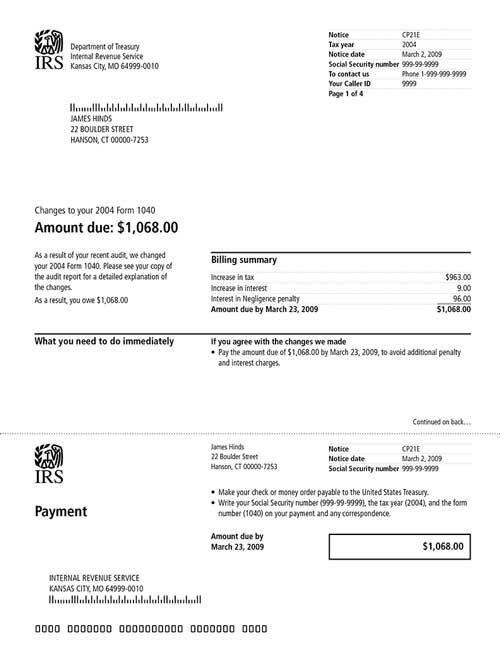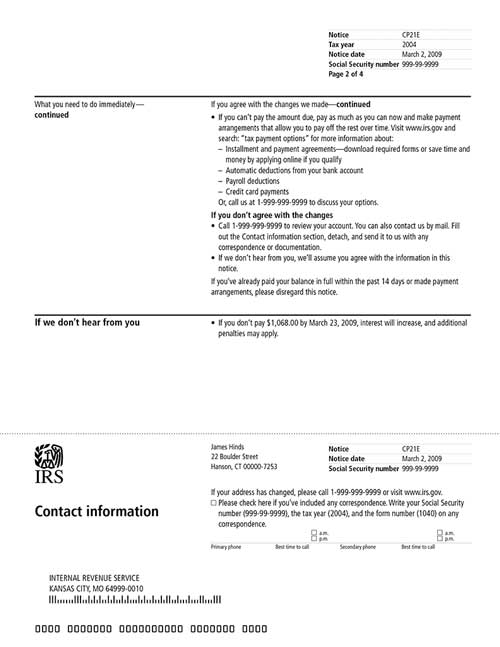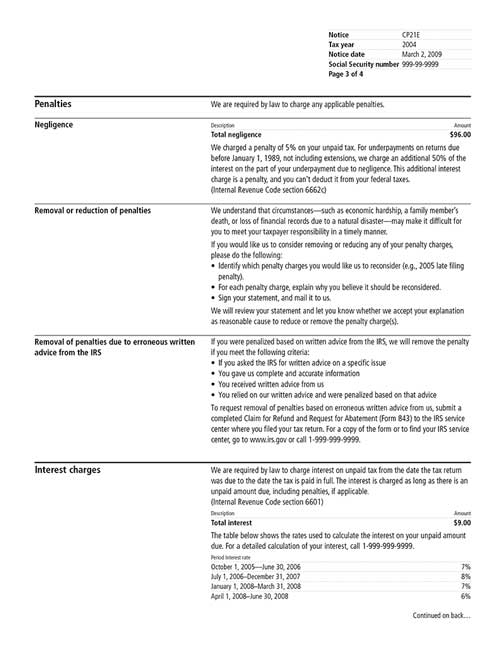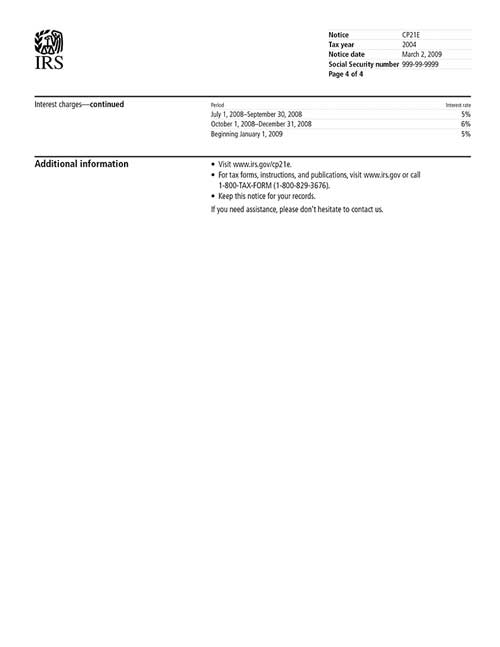IRS Notice CP21E
It is critical to know your rights before turning any information over to the IRS. San Diego Tax Attorney William D. Hartsock offers this advice.
Why did I receive a CP21E Notice from the IRS?
If you have received a CP21E Notice from the IRS, it usually means that as a result of a recent tax audit, the IRS has made certain changes to the tax return specified in the notice. Because of those changes, you now owe money on your taxes.
This could affect any Income Tax Audits & Appeals that you are involved in, as well as IRS Tax Litigation or Tax Collections actions.
Whenever you receive a CP21E Notice, you should:
- Read the CP21E Notice and the Audit Report (a separate document, usually on IRS Form 4849) carefully, especially the parts that identify the specific changes the IRS made to your return, explain why the IRS made those changes, and explain why the IRS believes you know owe money on your taxes. The changes the IRS will likely involve the IRS’s assertion that you had more taxable income than was reported on your original return, and consequently now have a higher tax obligation. Changes the IRS made to your income are usually found on lines 1 through 4 of the Audit Report. Any penalties and interest the IRS assessed against you as a result of the changes it made to your return are usually found on lines 17 through 19 of the Audit Report.
- Even if you agree with the changes the IRS made, it may still be a good idea to have a tax professional like the ones at www.TaxLawFirm.net take a second look before you sign and return the Audit Report consenting to assessment of additional tax against you and collection of that tax from you. Signing and returning an Audit Report to the IRS can prevent you from requesting an Audit Reconsideration if information and documentation supporting your position that the IRS’s changes to your return are not correct come to light. If the professional you consult agrees that the best course of action is for you to agree to the changes, you should be sure to change the copy of your tax return that you kept to reflect the changes that were made, and then pay the tax and penalties owed in full by the date specified in the notice.
- If you agree but are not able to pay the full amount owed by the due date, pay as much as you can by the due date. You will need make arrangements with the IRS for a payment plan to pay off the remaining balance you owe. It is wise to consult with a tax professional like the ones at www.TaxLawFirm.net to determine if it there is a reasonable opportunity to negotiate a reduction in the amount owed and/or get the IRS to withdraw some or all of the penalties it assessed. The facts and circumstances that will influence the outcome of such items are unique to each taxpayer and therefore must be presented to a tax professional for detailed analysis.
- If you do NOT agree with the changes the IRS made to your tax return and the amount the IRS says you now owe in taxes, the facts and circumstances in your case may warrant requesting an Audit Reconsideration. One key reason for requesting an Audit Reconsideration is when you have additional information and documentation that were not presented to the IRS agent during the audit. A tax professional like the ones at www.TaxLawFirm.net can help you identify such supporting documentation and present it to the IRS in a way that is specifically designed to get the IRS to accept your request for Audit Reconsideration.
Answers to Frequently Asked Tax Questions:
If I am not able to pay the full amount of tax I owe by the due date, will the amount of my tax obligation increase?
Interest will accrue on an unpaid tax balance beginning on the day after the tax is due. Also, you will be assessed a late payment penalty if the full amount of tax you owe is not paid on the day it is due. With respect to both interest and penalties, the due date is the last date on which you could file the tax return that is at issue, including extension requests.
How long do I have to request an Audit Reconsideration?
You can submit a request for Audit Reconsideration any time after an audit assessment has been made on your account and the tax remains unpaid. However, the IRS will not accept your request if you previously agreed to pay the amount of tax the IRS says you owe.
The following images are an example of what an IRS Tax Notice CP21E actually looks like.
This sample notice is for example purposes only. The case facts and figures on your notice will vary according to the specifics of your case.






Comments (0)